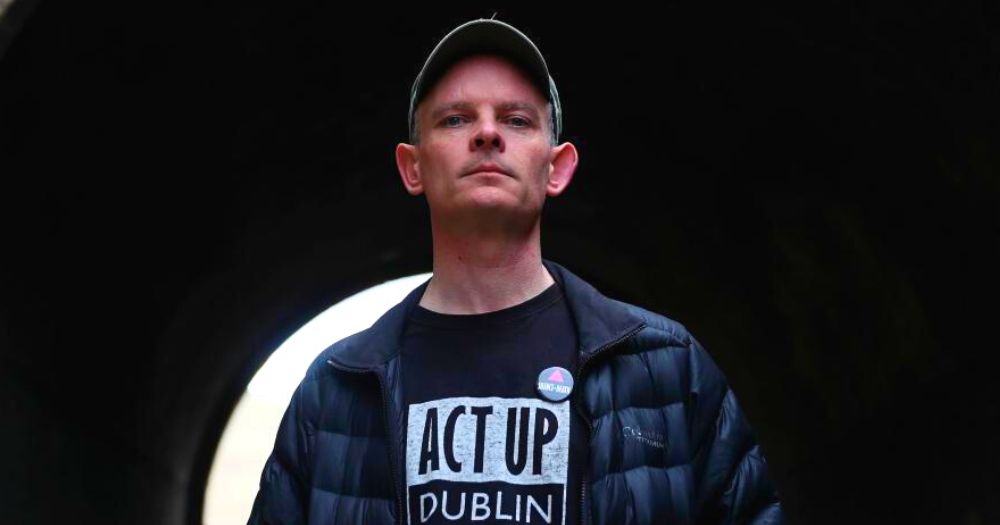Following the HSE’s announcement on Wednesday, August 17, on their disappointing plan regarding the Monkeypox (MPX) vaccine roll-out in Ireland, I cannot say I am surprised. The failure to act quickly is apparent but reveals a much bigger picture, and it is a picture many of us have been talking about for decades – a global one.
MPX is disproportionately affecting gays, bisexuals and men who have sex with men (gbMSM) in Ireland. Still, thankfully this cohort is very good at responding to health messaging. The response has been excellent, particularly with MPOWER’s information campaign, which has also been noted internationally. However, without the preventive tools needed, that only goes so far.
gbMSM have just come from a period where they had to restrict their sex lives and close contacts due to Covid-19. Now, they are being asked to do so again, with little other prevention available. Interestingly this didn’t occur with rapid Covid-19 vaccine output from pressure politically around the world.
It is important to note that MPX is not exclusively passed on through sexual activity but by close contact and for anyone regardless of sexuality or gender identity.
In Ireland, the plan announced by HSE acknowledges that only 10% of those they consider a high-risk group will be offered the Monkeypox vaccine in phase one. Those prioritised will be those who have had a notification to the HSE’s Infectious Disease Monitoring system (CIDR) of early infectious syphilis between December 2021 and July 2022.
Although the spread of syphilis is similar to Monkeypox, is this the best way of utilising a very scarce supply?
The HSE has said they will ensure a separate supply of Monkeypox vaccine for intermediate and high-risk contacts of a confirmed case in Ireland. But what happens beyond that?
Based on current indications in relation to global supplies of vaccines, the second phase roll-out in Ireland is likely to commence later this year and into next year. Hopefully.
And here lies the bigger issue.
Bavarian Nordic, the only company with an approved MPX vaccine, has stated this week that it isn’t sure it can meet demand as cases grow globally. This statement surfaced in the middle of them shutting down production to expand their plant and hopefully produce more vaccines by early next year. Bavarian Nordic has only one licensed facility in the US to fill and finish (fill vials and finish packaging) and not manufacture actual vaccine.
All of this is happening in the middle of an outbreak.
Paul Chaplin, Bavarian Nordic’s CEO, has said that a possible tech transfer could take three months if the process is sped up, which would allow the manufacture of the vaccine rather than just fill and finish. However, the Vice President of the company has said there are no concrete negotiations with bulk producers, but they are looking at what options there are.
This is all too late in the midst of what the World Health Organisation has declared a global health emergency (the previous one being Covid-19) alongside indicatives of what happens when pharmaceutical companies hold on rigidly to their intellectual property rights rather than opening up and allowing, under license, others to manufacture on their behalf from which of course they will profit anyway. We have seen this before, particularly in the early days of HIV antiretrovirals and the eventual production of generic versions in India pushed forward by activists.
So what can Ireland do? The HSE roll-out announced on Wednesday is an example of being too late. The HSE and Department of Health need to be ready to act quicker in the future as more emerging, and re-emerging viruses will come. But one of the most important things Ireland can do goes beyond local and beyond the HSE, Department and Minister for Health. Viruses are a global issue, and MPX first appeared in Central and Western Africa, particularly the Democratic Republic of Congo (Zaire), in the 1970s. Providing vaccines at the source quickly will contain potential global pandemics. Therefore, they must do this not just for Ireland and Europe but, in particular, for countries and indeed large continents that are far too often ignored until cases emerge in the Western World.
The Tánaiste and Minister for Enterprise, Trade and Employment, along with his colleague the Minister for Foreign Affairs need to meet with their European counterparts to work out a system of forcing, if it’s the case, pharmaceutical companies who can not get up to speed and produce enough vaccines and treatments to license immediately other companies to do so on their behalf without price-gouging, otherwise we will be back here time and time again.
Dr Michael Ryan, executive director of WHO’s Health Emergencies Programme, recently said: “Will human ingenuity and human fairness win out over greed and exploitation? We have never been, never… ever…. ever [sic.] been at a point where we can develop countermeasures so quickly against disease, and yet we have never been at a point where we are so unfair in how we distribute those.”
Noel Donnellon is a member of ACT UP Dublin and has completed both the Emerging and re-emerging viruses and HIV Science courses with the Institut Pasteur.
© 2022 GCN (Gay Community News). All rights reserved.
Support GCN
GCN is a free, vital resource for Ireland’s LGBTQ+ community since 1988.
GCN is a trading name of National LGBT Federation CLG, a registered charity - Charity Number: 20034580.
GCN relies on the generous support of the community and allies to sustain the crucial work that we do. Producing GCN is costly, and, in an industry which has been hugely impacted by rising costs, we need your support to help sustain and grow this vital resource.
Supporting GCN for as little as €1.99 per month will help us continue our work as Ireland’s free, independent LGBTQ+ media.
